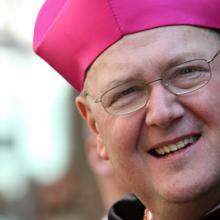welcoming congregations
As I spoke to other transgender Christians, I found that many expressed frustration with the lack of education on trans issues in their churches. They told me that even though trans people are being recognized in the media, real and relevant conversations are just not happening in the sanctuary or at Bible study. Maybe folks are worried about saying the wrong thing, or perhaps our churches don’t make space for discussion. Whatever the reason, we as Christians are called into fellowship with one another, and real fellowship takes education and communication. In that spirit, here are seven things that transgender people in your congregation wish you knew.
NEW YORK — When Cardinal Timothy Dolan used the morning talk shows on Easter Sunday to say the Catholic Church could do a better job of welcoming gays and lesbians, his remarks were hailed by one activist as an “Easter miracle” and by another as an encouraging “first step.”
But two months later, it’s still not clear what the second step in this fraught process might be, or even if there is a second step. And there are signs that things may only get more complicated.
Since Easter, three more states have passed same-sex marriage laws, and next month the U.S. Supreme Court will hand down a gay marriage ruling that will again spotlight the bishops’ full-throated opposition to a whole host of civil protections for gays and lesbians, particularly marriage.
Moreover, as Americans — and American Catholics — grow increasingly accepting of homosexuality, and as foes of gay rights grow increasingly determined, conflict at the parish level seems inevitable. The uneasy “Don’t Ask/Don’t Tell” policy that once allowed gay and lesbian Catholics to take church positions is clashing with their increasing visibility in the form of marriage licenses or wedding announcements.

